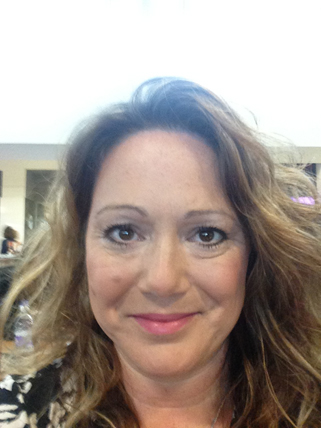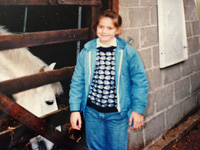Stay positive and never tell yourself what you won’t be able to achieve says Georgina who hasn't let diabetes get in the way of her life.


I can still remember the day of my diagnosis. I was eight and I overheard the GP telling my Mum she thought it was diabetes and I had to be admitted to hospital. I remember thinking all the way there dia – a –betes – that means I’m going to die.
Once I arrived and shuffled into a consulting room, my Mum gave me a chocolate bar because I was weak and the nurse swiftly removed it and said there would be no more of that!
Thankfully after three weeks of upset stomachs, terrible food and catching every bug on the ward I was released home feeling more optimistic and glad not to feel quite so ill anymore.
The early days were hard, I was very active and loved horse riding but found I was always having to stop mid play at school or mid riding lesson to rectify my crashing blood sugars, only to stuff my face and rebound high afterwards.
The hardest part sometimes was just being different and not being allowed the same foods at the lunch table. I went through a stage where I would scream for five minutes before allowing anyone to prick my finger and I became obsessive about my results, feeling like a failure every time I got a high result.
I was so hard on myself and then would become upset and mourn the fact I was such a victim of life’s cruel fate.The years went by and I became more determined not to let it affect my life. I did the normal regular teenage bit along with the cigarettes and alcohol at times to go with it, but never stopped doing my blood sugars or injections with it.

Life wasn't kind to me as a teenager and looking back my diabetes wasn’t my main concern and I started to have a few problems with things like carpal tunnel probably due to a lack of control in my blood sugars. When I was 19 I was approached by my consultant to be part of a trial using an insulin pump.
He felt my active lifestyle and college life would be a good fit with the trials inclusion criteria. The pump suited me well and gave me a greater level of flexibility over what I could eat and drink and when. After I left college I got a job in the pharmaceutical sales job and this was a real turning point for me.
During the initial training they brought three guests in to talk about their life with diabetes and one of the girls has remained in my memory to this day. She had long beautiful hair and was only in her mid thirties yet she was dying from kidney failure due to her diabetes and had a thirst that only 15 diet cokes a day would quench. She would never have children or see her old age and it occurred to me that diabetes can be a disease of choice to a large extent.
No we cannot say it would not have happened anyway but by her own admission she would skip her injections and ignore her diabetes, focusing on the negative and establishing herself as different and in denial of her disease.. I made an interesting observation about how her clinicians had managed her as well – they had told her what she couldn’t do – have children, and well be normal basically!
Faced with such a future vision at an early age that seemed to have in part set her on the track to viewing herself as a victim and always seeing what she couldn’t achieve rather than what she could.
I was not going to live my life like that; this disease would not stop me and my ambitions – ok so it takes 12 years on average off our lives – so do lots of things like drinking, smoking or horseriding! – In fact it was falling off my horse not my diabetes that had caused my last two hospital visits, something my consultant found highly amusing!
We have more choices than people with terminal Cancer, Multiple Sclerosis and a host of other conditions and more chances for a normal life too. I went on to become passionate about delivering new treatments and drugs to support patients in my work life and did not hide my diabetes from anyone. I dated men with openness and honestly but did not ever suggest that my life and theirs may be affected by my condition – no one knows what tomorrow will bring for any of us.
Mindset with diabetes is such a huge thing – let yourself have a down day yes - it’s a full time 24/ 7 job but get back up and fight when that 24 hours of down is done. I went on to marry and have four beautiful children. My first three were born at 38 weeks and my fourth at 36 weeks, six days due to a weak uterine wall.
I delivered them all by c-section and never regretted not having a natural birth – work with what you have and do not risk yourself or the baby or feel like a failure – just carrying a child and bringing it into this life is an amazing achievement for any women. Pregnancy was hard because every time you had a high sugar result it not only affected you, but also your baby and a sense of guilt came with that.
By my fourth my mind set was much better and I would tell myself I am doing my best, I am giving it my all and I should be proud of that. It’s not the individual moments of a less than ideal result that matter - three blood readings of 18 in four weeks is not insurmountable just as long as you are always working to and thinking about how to stabilize things going forward.
Don’t panic is one of my biggest tips! It’s so easy after a high reading to flood yourself with insulin and then come crashing down to a low two hours later, I have learnt to think it through, give myself a correction dose, take light exercise and then retest.I have now had diabetes 29 years and have four beautiful children, a happy marriage, a great career, and a good quality of life.
I do have problems with my tendons from time to time and my feet are stiff on waking due to plantar fasciitis (which is common in people without diabetes aswell) . I also have some background retinopathy but have never needed laser treatment.
I concentrate on today. I try not to worry about the future, we could spend 12 months worrying about diabetes complications and an early death that is more likely to happen when I am driving and flying around the world with my job and would stop me living the moment and enjoy what I have now.
I think everyone has their demons, mine just happens to be diabetes. My advice to anyone setting off on their journey with Type 1 Juvielle diabetes or anyone supporting them is to stay positive never tell yourself what you won’t be able to achieve, work with your medical team and your consultant – they are one of the most important partnerships you can have – they can’t fix you so don’t expect them to, but they can be your partner in this journey.
There are so many positive stories and books about people living well into old age with Type 1 diabetes – read them all! Do not google negative statistics – you are not a statistic you are an individual, and your path hasen’t been written yet!
Look after yourself mentally physically and emotionally, treat your diabetes with respect and manage it as best you can and be kind to yourself. You are amazing managing this disease every day and you can live a long and happy life!
